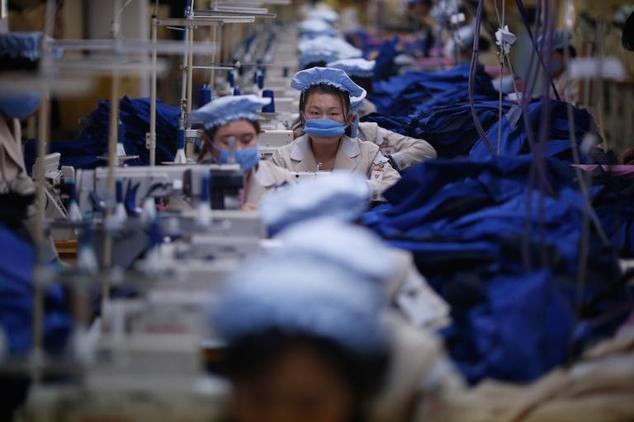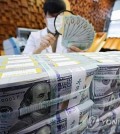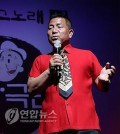- California Assembly OKs highest minimum wage in nation
- S. Korea unveils first graphic cigarette warnings
- US joins with South Korea, Japan in bid to deter North Korea
- LPGA golfer Chun In-gee finally back in action
- S. Korea won’t be top seed in final World Cup qualification round
- US men’s soccer misses 2nd straight Olympics
- US back on track in qualifying with 4-0 win over Guatemala
- High-intensity workout injuries spawn cottage industry
- CDC expands range of Zika mosquitoes into parts of Northeast
- Who knew? ‘The Walking Dead’ is helping families connect
S. Korea to ‘completely’ shut down joint industrial complex
SEOUL (Yonhap) — South Korea said Wednesday it has decided to “completely” shut down a joint industrial complex in North Korea in response to the North’s recent nuclear test and long-range rocket launch.
The Unification Ministry announced that it will suspend the operation of the Kaesong Industrial Complex in the North’s border city of the same name, the last remaining symbol of inter-Korean reconciliation.
Seoul’s move is part of its “bone-numbing” measures against North Korea’s nuclear test on Jan. 6 and its long-range missile launch earlier this week.
On Sunday, the North launched a long-range rocket carrying a satellite, which Seoul and Washington view as a cover for a banned test of intercontinental ballistic technology.
“Despite our efforts to support the Kaesong complex, the factory zone is seen as being used for North Korea’s development of nuclear weapons and long-range missiles,” Unification Minister Hong Yong-pyo said in a press briefing. “We’ve decided to halt the operation of the Kaesong complex to prevent South Korean money from being funneled into the North’s nuke and missile developments and to protect our companies.”
A total of 124 South Korean companies are operating in the zone, some 50 kilometers northwest of Seoul, employing more than 54,000 North Korean workers to produce labor-intensive goods, such as clothes and utensils.
The complex, opened in 2004, has served as a major revenue source for the cash-strapped North, while South Korea has benefited from cheap but skilled North Korean labor. The South Korean firms annually provide about US$100 million in total to North Korean workers for income.
The suspension of the complex is Seoul’s toughest measure aimed at cutting off North Korea’s remaining source of hard currency.
It had been recognized as an exception to Seoul’s sanctions against Pyongyang designed to punish it for the sinking of a South Korean warship in 2010.
Since its inception, around $560 million in total has been provided to North Korean workers at the factory zone including $120 million last year, according to the ministry.
A ministry official said that it is not the time to talk about when and whether operations at the complex can be resumed.
“Whether the park can be reopened will entirely hinge on North Korea,” he said. “The North should first dispel the international community’s concerns about its nuclear and missile developments, and provide a favorable atmosphere for our firms to normally operate factories.”
In April 2013, the North shut down the complex for about four months, citing what it called heightened tensions sparked by a military drill between Seoul and Washington. In February of that year, the North conducted its third nuclear test.
The two Koreas agreed not to shut it down again “under any circumstances,” when they decided to reopen it.
“The government has decided to halt the operation of the complex on the grounds that the North’s latest moves have made it difficult for Seoul to run it as normal,” said a ranking ministry official.
The ministry said it notified North Korea of its decision earlier in the day, asking it to cooperate for the safe return of South Koreans staying there. The North has not shown an immediate reaction.
The South also plans to cut off electricity and water to the industrial complex, which may face strong backlash from the North, as some North Korean residents in the city of Kaesong rely on water supply from the South.
The ministry said it will complete the withdrawal of the remaining South Koreans there within the following days. Seoul has imposed an entry limit on its nationals to the factory zone since the North’s fourth nuclear test.
The government also added that it will provide the necessary support to the South Korean firms at the complex to help minimize their financial losses.
The Foreign Ministry said that it has informed regional powers including the U.S. and China ahead of Seoul’s announcement to suspend the complex via diplomatic channels.
Also Wednesday, Japan said that it has decided to slap its own fresh sanctions against North Korea in response to the North’s rocket launch. The measures include an entry ban on North Korean-flagged ships into ports in Japan and a tight grip on money transfer to the North.
Japan eased some of its sanctions on North Korea in July 2014 as Pyongyang agreed to investigate into the fate of Japanese nationals abducted by the communist country decades ago.
















